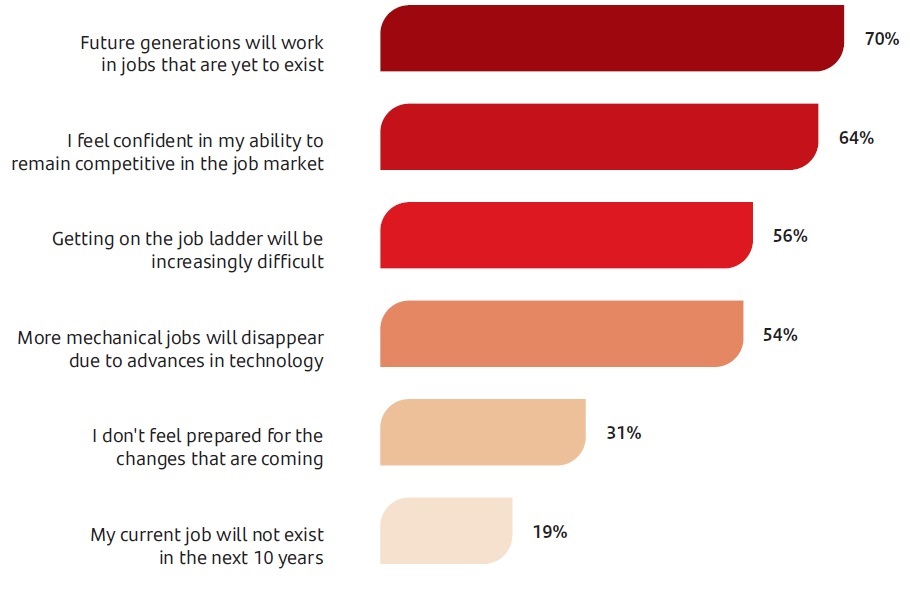Chapter 2
Skills market


- Press Room
- Tomorrow’s skills
- Skills market
- Artificial intelligence leads the way in terms of desired subject areas. 61% believe it will be the most in-demand area in the next five years, while 58% deem it pivotal to enter and remain in the job market.
- 70% believe that jobs that are yet to exist will emerge, while 31% say they are not equipped to face tomorrow’s challenges.
- Though digital learning platforms have considerable potential, only 11% say they’re aware of them.
- Occupational mobility (whether a change of role, sector or company within the same sector) is high overall, especially in Europe, where 70% of participants have made such a change.
The job market is undergoing constant change, driven by the roll-out of artificial intelligence and digitalization, among other reasons.
According to Tomorrow’s skills, 70% of the survey participants believe that jobs that are yet to exist will emerge, and 61% agree that AI and data science will feature among the most in-demand areas in the next five years.
Learning technical skills is not the only area of interest as soft skills are also key — 45% believe that soft skills will be more important than technical skills when it comes to getting a job or promotion.
The report highlights the need to use digital learning platforms to avoid stalling career development, though only 11% of the survey participants declare to be aware of any.

A transformative landscape that also brings uncertainty
Artificial intelligence and digitalization are clearly effecting change. Despite their benefits, they also pose questions over access to the job market, as 56% of participants believe it’s becoming increasingly challenging to get on the job ladder. What’s more, 19% think their role will no longer exist in the next 10 years, and 54% believe that more “mechanical” positions will disappear on the back of technological advances.
This is more common among senior executives and employees in finance, technology, communications, transport and logistics, where technological disruption is developing at a rate of knots. Total percentage of survey participants who agree with these statements
Total percentage of survey participants who agree with these statements
This report also outlines how job rotation and occupational mobility are becoming more conventional in most regions. The findings show that 70% of the survey participants declare to have changed sector, company or role during their career.
have changed sector
have moved to another company within the same sector
have changed role within the same organization
have changed sector
have moved to another company within the same sector
have changed role within the same organization
This is mainly evident in Europe, whereas in Latin America, 32% state that they haven’t changed role, sector or company, the lowest figure among the regions surveyed.
The swiftness in seeking and mastering new skills will be the hallmark of individuals’ employability and an effective workforce worldwide. In a world where the technical skills that jobs require are changing rapidly, the behaviour and attitude towards dealing with these changes proactively are critical for both employees and employers. The ability to use AI and other new technologies will be paramount; however, the desire to develop — the belief that one can learn new things through hard work — will be even more important. Forming this mindset empowers individuals to seek out training resources on their own, learn from their peers, and make the most of formal education opportunities as they arise.
Mona Mourshed, Founder and Global CEO of Generation


